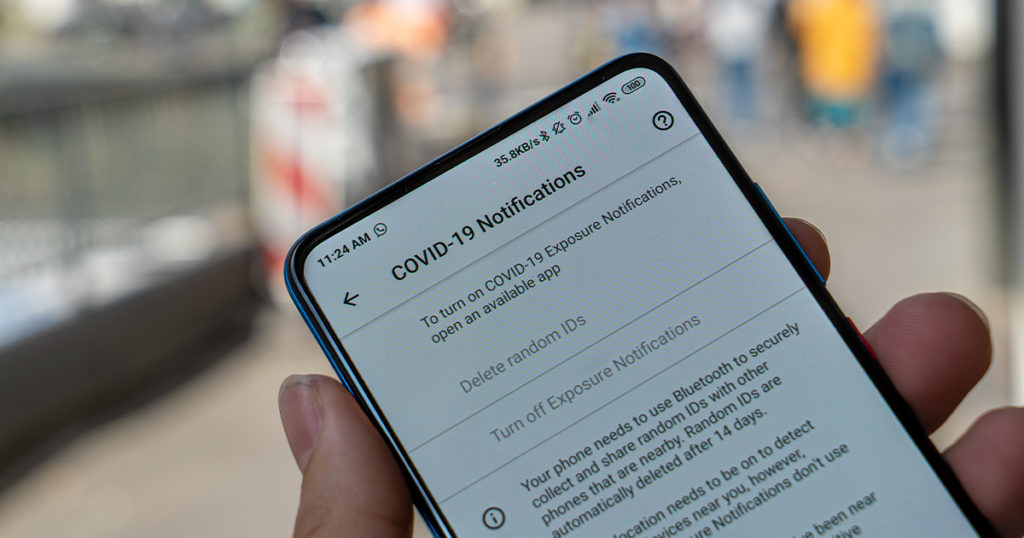Johns Hopkins University today released a comprehensive report to help government, technology developers, businesses, institutional leaders and the public make responsible decisions around use of digital contact tracing technology (DCTT), including smartphone apps and other tools, to fight COVID-19.
Digital Contact Tracing for Pandemic Response – a report led by the Berman Institute for Bioethics in collaboration with the Center for Health Security at Johns Hopkins, as well as leading experts worldwide – highlights the ethical, legal, policy and governance issues that must be addressed as DCTT are developed and implemented. The report’s primary conclusions and recommendations advise that privacy should not outweigh public health goals and other values; that big technology companies should not unilaterally set terms when such broad public interests are at stake; and that decisions about the technology and its uses will have to be constantly updated as new information becomes available.
As officials in many countries strive to find a balance between respecting civil liberties and controlling the pandemic, the report offers clear, well-supported guidance for leaders as they consider deployment and use of these technologies, as well as the data they collect, store and share.
As we move forward, we must strike a balance between privacy and values like equity, choice, economic well-being and solidarity,“As we move forward, we must strike a balance between privacy and values like equity, choice, economic well-being and solidarity,” said Jeffrey Kahn, PhD, MPH, director of the Johns Hopkins Berman Institute for Bioethics. “Too much emphasis on privacy could severely limit the ability to gather information that is critical for effective and efficient contact tracing to help beat the pandemic, and so the full range of interests and values of the public must drive this conversation—and not just those asserted by tech companies.”
The report makes numerous recommendations, including:
- Technology design should not be static. There is no “one size fits all” approach. Design should be capable of evolving depending upon local conditions, new evidence and changing preferences and priorities.
- Technology companies alone should not control the terms, conditions, or capabilities of DCTT. Nor should they presume to know what is acceptable to members of the public.
- DCTT should be designed to have a base set of features that protect privacy, with layers of additional capabilities that users can choose to activate. A default should be that user location data are not shared, but users should be provided with easy mechanisms and prompts to allow for opting-in to this capability, especially if opting-in is critical to achieving public health goals.
- De-identified data collected through DCTT should be made available to public health professionals and researchers to support population-level studies and analyses.
- Those who authorize use of DCTT within a particular jurisdiction or institution should continuously and systematically monitor the technology’s performance in that context. This should include monitoring for effectiveness and benefit, monitoring for harms and monitoring for the fair distribution of both benefits and harms.
- Governments should not require mandatory use of DCTT given the uncertainty about potential burdens and benefits. Additional technology, user and real-world testing is needed.
- Congress should enact legislation specifically tailored to use of DCTT as part of the response to COVID-19 , which would facilitate uses of DTCC to promote the public health response while protecting citizens.
“In this time of COVID-19, digital technologies have an unprecedented capacity to accelerate and improve the way the world responds to infectious disease outbreaks and pandemics,” said Johns Hopkins University President Ronald J. Daniels. “The digital contact tracing technologies represent great opportunity. They also present significant ethical, legal and governance concerns that we, as a society, must grapple with. I’m grateful to the Berman Institute of Bioethics together with the Center for Health Security for leading this effort and galvanizing some of the nation and the world’s foremost leaders on these issues to share their knowledge on this complex and timely set of issues.”
The report is the result of a rapid research and expert consensus effort led by a group of leaders in bioethics, health security, public health, technology, engineering, public policy and law. A list of authors can be found here . The full report is available free of charge here . Hard copies to order and free e-versions are available online wherever books are sold.
Johns Hopkins will host a web briefing on the report and the broader conversation around testing and contact tracing at 2 p.m. on Wednesday, May 27. Visit the Johns Hopkins Coronavirus Resource Center live event page to register.
For more information on COVID-19 contact tracing, visit the Johns Hopkins Coronavirus Resource Center at https://coronavirus.jhu.edu/contact-tracing .

